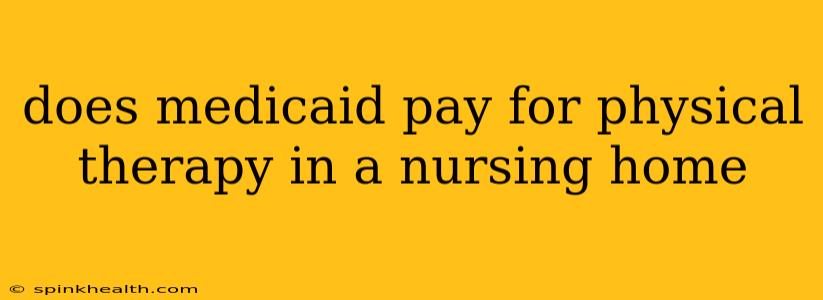Does Medicaid Pay for Physical Therapy in a Nursing Home? A Look Inside the System
The question of whether Medicaid covers physical therapy (PT) in a nursing home isn't a simple yes or no. It's a journey into the intricate world of healthcare financing, a world where eligibility, specific state regulations, and the individual's unique circumstances all play a crucial role. Imagine this: Mrs. Gable, recovering from a stroke, needs intensive physical therapy to regain her mobility. Will Medicaid cover her care? Let's unravel the complexities to find out.
What is Medicaid's Role in Nursing Home Care?
Medicaid, a joint state and federal program, is designed to provide healthcare coverage for low-income individuals and families. A significant portion of its funding goes towards long-term care, including nursing home stays. However, the coverage isn't a blanket guarantee for every service. Medicaid's role is to help individuals access medically necessary care, and this is where the nuances emerge.
Is Physical Therapy Considered Medically Necessary?
This is a critical point. For Medicaid to cover physical therapy in a nursing home, the therapy must be deemed medically necessary. This isn't determined by the patient or the nursing home, but by a qualified healthcare professional, often a physician. The doctor must document the medical need for PT, outlining specific goals, the expected outcomes, and how the therapy directly contributes to the patient's overall health and well-being. Simple maintenance or general fitness improvement usually doesn't qualify.
How Does Medicaid Determine Coverage?
Medicaid coverage for physical therapy isn't uniform across all states. Each state administers its Medicaid program with some level of autonomy, leading to variations in benefits and eligibility criteria. Some states may have stricter guidelines on what constitutes medically necessary PT, leading to differences in coverage.
Furthermore, the specific nursing home plays a role. The facility must be licensed and participate in the Medicaid program. They must also properly document the therapy provided, ensuring it aligns with the physician's orders and Medicaid's requirements. Failure to do so can lead to denial of payment.
What Documentation is Required?
The documentation process is vital for ensuring Medicaid coverage. This usually involves:
- Physician's order: A clear and concise order from the patient's doctor specifying the need for PT, including frequency, duration, and goals.
- Therapy plan of care: A detailed plan outlining the specific exercises, techniques, and expected outcomes of the therapy.
- Progress notes: Regular updates from the physical therapist documenting the patient's progress, any adjustments to the plan, and the overall effectiveness of the therapy. This shows Medicaid the therapy is actively contributing to the patient's recovery.
What if Medicaid Doesn't Cover the Full Cost?
Even with Medicaid coverage, it might not cover the entire cost of physical therapy. There may be co-pays, deductibles, or other cost-sharing responsibilities. It's crucial for patients and their families to understand their specific Medicaid plan and the associated costs.
Are There Other Funding Options?
If Medicaid doesn't fully cover PT, or if the patient doesn't qualify for Medicaid, other options might exist. These include:
- Medicare: If the individual qualifies for Medicare, it may cover some portion of the PT costs, especially if the therapy is related to a recent hospital stay.
- Private insurance: Supplemental private insurance policies can often help bridge the gap in coverage.
- Charitable organizations: Many charitable organizations offer financial assistance for healthcare expenses.
In Conclusion:
Whether Medicaid pays for physical therapy in a nursing home hinges on several factors: medical necessity, state-specific regulations, proper documentation, and the individual's eligibility. While Medicaid aims to provide access to necessary healthcare services, navigating the system can be complex. Understanding the requirements and seeking professional guidance is key to ensuring that Mrs. Gable—and others like her—receive the care they need. Don't hesitate to contact your state's Medicaid office or a healthcare professional for personalized information.

